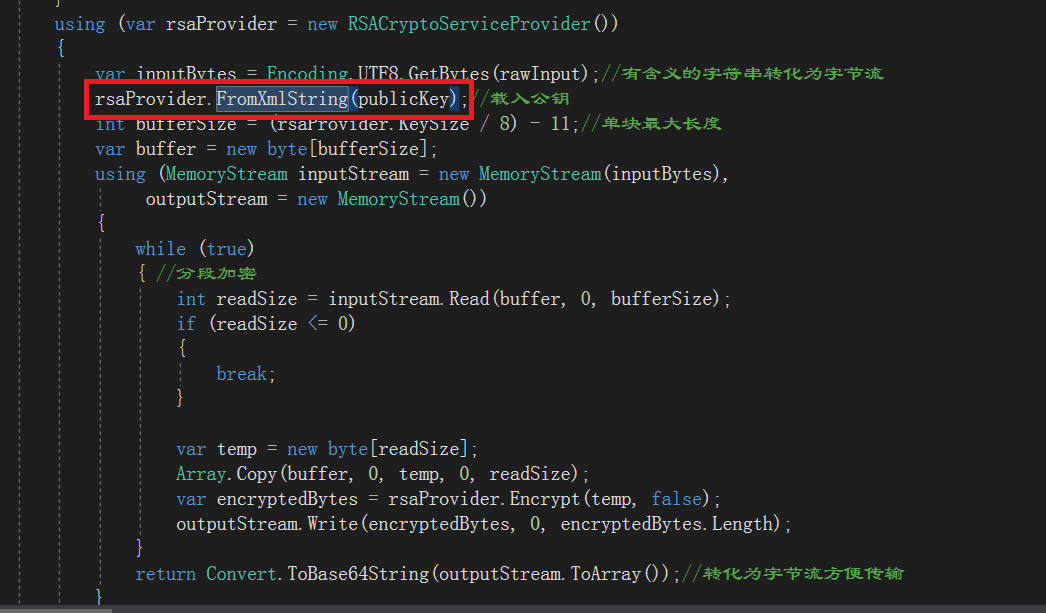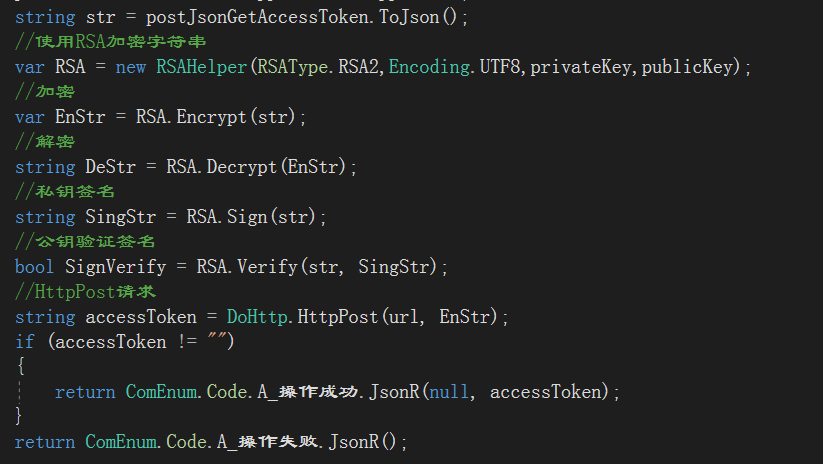.net core实现RSA加密解密
2019-09-26 16:12 .net小跟班(杜) 阅读(3239) 评论(2) 编辑 收藏 举报今天在调用辉通停车接口的时候使用的是RSA双向加密技术 但接口文档提供给我的是java的RSA加密公钥,但是.net中需要转化成XML格式的publicKey 于是一通转化,终于成功转成了标准的XML 松了一口气,但是在调试的时候发现我现在使用的是牛逼的.net core呀 不支持FromXmlString

下面总结了一套适用于.net core的RSA加密技术 代码呈上来
#region RSAhelper public class RSAHelper { private readonly RSA _privateKeyRsaProvider; private readonly RSA _publicKeyRsaProvider; private readonly HashAlgorithmName _hashAlgorithmName; private readonly Encoding _encoding; /// <summary> /// 实例化RSAHelper /// </summary> /// <param name="rsaType">加密算法类型 RSA SHA1;RSA2 SHA256 密钥长度至少为2048</param> /// <param name="encoding">编码类型</param> /// <param name="privateKey">私钥</param> /// <param name="publicKey">公钥</param> public RSAHelper(RSAType rsaType, Encoding encoding, string privateKey, string publicKey = null) { _encoding = encoding; if (!string.IsNullOrEmpty(privateKey)) { _privateKeyRsaProvider = CreateRsaProviderFromPrivateKey(privateKey); } if (!string.IsNullOrEmpty(publicKey)) { _publicKeyRsaProvider = CreateRsaProviderFromPublicKey(publicKey); } _hashAlgorithmName = rsaType == RSAType.RSA ? HashAlgorithmName.SHA1 : HashAlgorithmName.SHA256; } #region 使用私钥签名 /// <summary> /// 使用私钥签名 /// </summary> /// <param name="data">原始数据</param> /// <returns></returns> public string Sign(string data) { byte[] dataBytes = _encoding.GetBytes(data); var signatureBytes = _privateKeyRsaProvider.SignData(dataBytes, _hashAlgorithmName, RSASignaturePadding.Pkcs1); return Convert.ToBase64String(signatureBytes); } #endregion #region 使用公钥验证签名 /// <summary> /// 使用公钥验证签名 /// </summary> /// <param name="data">原始数据</param> /// <param name="sign">签名</param> /// <returns></returns> public bool Verify(string data, string sign) { byte[] dataBytes = _encoding.GetBytes(data); byte[] signBytes = Convert.FromBase64String(sign); var verify = _publicKeyRsaProvider.VerifyData(dataBytes, signBytes, _hashAlgorithmName, RSASignaturePadding.Pkcs1); return verify; } #endregion #region 解密 public string Decrypt(string cipherText) { if (_privateKeyRsaProvider == null) { throw new Exception("_privateKeyRsaProvider is null"); } return Encoding.UTF8.GetString(_privateKeyRsaProvider.Decrypt(Convert.FromBase64String(cipherText), RSAEncryptionPadding.Pkcs1)); } #endregion #region 加密 public string Encrypt(string text) { if (_publicKeyRsaProvider == null) { throw new Exception("_publicKeyRsaProvider is null"); } return Convert.ToBase64String(_publicKeyRsaProvider.Encrypt(Encoding.UTF8.GetBytes(text), RSAEncryptionPadding.Pkcs1)); } #endregion #region 使用私钥创建RSA实例 public RSA CreateRsaProviderFromPrivateKey(string privateKey) { var privateKeyBits = Convert.FromBase64String(privateKey); var rsa = RSA.Create(); var rsaParameters = new RSAParameters(); using (BinaryReader binr = new BinaryReader(new MemoryStream(privateKeyBits))) { byte bt = 0; ushort twobytes = 0; twobytes = binr.ReadUInt16(); if (twobytes == 0x8130) binr.ReadByte(); else if (twobytes == 0x8230) binr.ReadInt16(); else throw new Exception("Unexpected value read binr.ReadUInt16()"); twobytes = binr.ReadUInt16(); if (twobytes != 0x0102) throw new Exception("Unexpected version"); bt = binr.ReadByte(); if (bt != 0x00) throw new Exception("Unexpected value read binr.ReadByte()"); rsaParameters.Modulus = binr.ReadBytes(GetIntegerSize(binr)); rsaParameters.Exponent = binr.ReadBytes(GetIntegerSize(binr)); rsaParameters.D = binr.ReadBytes(GetIntegerSize(binr)); rsaParameters.P = binr.ReadBytes(GetIntegerSize(binr)); rsaParameters.Q = binr.ReadBytes(GetIntegerSize(binr)); rsaParameters.DP = binr.ReadBytes(GetIntegerSize(binr)); rsaParameters.DQ = binr.ReadBytes(GetIntegerSize(binr)); rsaParameters.InverseQ = binr.ReadBytes(GetIntegerSize(binr)); } rsa.ImportParameters(rsaParameters); return rsa; } #endregion #region 使用公钥创建RSA实例 public RSA CreateRsaProviderFromPublicKey(string publicKeyString) { // encoded OID sequence for PKCS #1 rsaEncryption szOID_RSA_RSA = "1.2.840.113549.1.1.1" byte[] seqOid = { 0x30, 0x0D, 0x06, 0x09, 0x2A, 0x86, 0x48, 0x86, 0xF7, 0x0D, 0x01, 0x01, 0x01, 0x05, 0x00 }; byte[] seq = new byte[15]; var x509Key = Convert.FromBase64String(publicKeyString); // --------- Set up stream to read the asn.1 encoded SubjectPublicKeyInfo blob ------ using (MemoryStream mem = new MemoryStream(x509Key)) { using (BinaryReader binr = new BinaryReader(mem)) //wrap Memory Stream with BinaryReader for easy reading { byte bt = 0; ushort twobytes = 0; twobytes = binr.ReadUInt16(); if (twobytes == 0x8130) //data read as little endian order (actual data order for Sequence is 30 81) binr.ReadByte(); //advance 1 byte else if (twobytes == 0x8230) binr.ReadInt16(); //advance 2 bytes else return null; seq = binr.ReadBytes(15); //read the Sequence OID if (!CompareBytearrays(seq, seqOid)) //make sure Sequence for OID is correct return null; twobytes = binr.ReadUInt16(); if (twobytes == 0x8103) //data read as little endian order (actual data order for Bit String is 03 81) binr.ReadByte(); //advance 1 byte else if (twobytes == 0x8203) binr.ReadInt16(); //advance 2 bytes else return null; bt = binr.ReadByte(); if (bt != 0x00) //expect null byte next return null; twobytes = binr.ReadUInt16(); if (twobytes == 0x8130) //data read as little endian order (actual data order for Sequence is 30 81) binr.ReadByte(); //advance 1 byte else if (twobytes == 0x8230) binr.ReadInt16(); //advance 2 bytes else return null; twobytes = binr.ReadUInt16(); byte lowbyte = 0x00; byte highbyte = 0x00; if (twobytes == 0x8102) //data read as little endian order (actual data order for Integer is 02 81) lowbyte = binr.ReadByte(); // read next bytes which is bytes in modulus else if (twobytes == 0x8202) { highbyte = binr.ReadByte(); //advance 2 bytes lowbyte = binr.ReadByte(); } else return null; byte[] modint = { lowbyte, highbyte, 0x00, 0x00 }; //reverse byte order since asn.1 key uses big endian order int modsize = BitConverter.ToInt32(modint, 0); int firstbyte = binr.PeekChar(); if (firstbyte == 0x00) { //if first byte (highest order) of modulus is zero, don't include it binr.ReadByte(); //skip this null byte modsize -= 1; //reduce modulus buffer size by 1 } byte[] modulus = binr.ReadBytes(modsize); //read the modulus bytes if (binr.ReadByte() != 0x02) //expect an Integer for the exponent data return null; int expbytes = (int)binr.ReadByte(); // should only need one byte for actual exponent data (for all useful values) byte[] exponent = binr.ReadBytes(expbytes); // ------- create RSACryptoServiceProvider instance and initialize with public key ----- var rsa = RSA.Create(); RSAParameters rsaKeyInfo = new RSAParameters { Modulus = modulus, Exponent = exponent }; rsa.ImportParameters(rsaKeyInfo); return rsa; } } } #endregion #region 导入密钥算法 private int GetIntegerSize(BinaryReader binr) { byte bt = 0; int count = 0; bt = binr.ReadByte(); if (bt != 0x02) return 0; bt = binr.ReadByte(); if (bt == 0x81) count = binr.ReadByte(); else if (bt == 0x82) { var highbyte = binr.ReadByte(); var lowbyte = binr.ReadByte(); byte[] modint = { lowbyte, highbyte, 0x00, 0x00 }; count = BitConverter.ToInt32(modint, 0); } else { count = bt; } while (binr.ReadByte() == 0x00) { count -= 1; } binr.BaseStream.Seek(-1, SeekOrigin.Current); return count; } private bool CompareBytearrays(byte[] a, byte[] b) { if (a.Length != b.Length) return false; int i = 0; foreach (byte c in a) { if (c != b[i]) return false; i++; } return true; } #endregion } /// <summary> /// RSA算法类型 /// </summary> public enum RSAType { /// <summary> /// SHA1 /// </summary> RSA = 0, /// <summary> /// RSA2 密钥长度至少为2048 /// SHA256 /// </summary> RSA2 } #endregion
调用方式呈上来

嗯 就这样了




【推荐】国内首个AI IDE,深度理解中文开发场景,立即下载体验Trae
【推荐】编程新体验,更懂你的AI,立即体验豆包MarsCode编程助手
【推荐】抖音旗下AI助手豆包,你的智能百科全书,全免费不限次数
【推荐】轻量又高性能的 SSH 工具 IShell:AI 加持,快人一步
· 从 HTTP 原因短语缺失研究 HTTP/2 和 HTTP/3 的设计差异
· AI与.NET技术实操系列:向量存储与相似性搜索在 .NET 中的实现
· 基于Microsoft.Extensions.AI核心库实现RAG应用
· Linux系列:如何用heaptrack跟踪.NET程序的非托管内存泄露
· 开发者必知的日志记录最佳实践
· TypeScript + Deepseek 打造卜卦网站:技术与玄学的结合
· Manus的开源复刻OpenManus初探
· AI 智能体引爆开源社区「GitHub 热点速览」
· 从HTTP原因短语缺失研究HTTP/2和HTTP/3的设计差异
· 三行代码完成国际化适配,妙~啊~